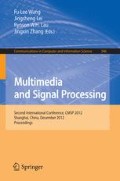Abstract
Hybrid discriminant analysis (HDA) combining principal component analysis (PCA) with linear discriminant analysis (LDA) can achieve better performance for samples following complex distribution. However, HDA can not work well for complex and nonlinear distributed data. As a result, a locality preserving HAD (LPKHDA) algorithm is proposed by combining the kernel method with manifold learning, overcoming the shortcomings of manifold learning and kernel methods. According to kernel-induced selection criterion, the optimal kernel parameter of LPKHDA can be achieved efficiently through gradient method and a boosted LPKHDA algorithm based on Adaboost idea is implemented. Extensive experiments are conducted to evaluate the proposed algorithm.
Access this chapter
Tax calculation will be finalised at checkout
Purchases are for personal use only
Preview
Unable to display preview. Download preview PDF.
References
Zhao, H., Yuen, P.C., Kwok, J.T.: A Novel Incremental principal component analysis and its application for face recognition. IEEE Trans. System, Man, and Cybernetics-Part B:Cybernetics 36(4), 873–886 (2006)
Duda, R., Hart, P., Stork, D.: Pattern Classification, 2nd edn. Wiley, New York (2001)
Lu, Y., Tian, Q.: Discriminant subspace analysis: An adaptive approach for image classification. IEEE Trans. Multimedia 11(7), 1289–1300 (2009)
Sui, J., Adali, T., Pearlson, G.: A CCA+ICA based model for multi-task brain imaging data fusion and its application to schizophrenia. NeuroImage 51, 123–134 (2010)
Tao, Q., Wu, G., Wang, J.: The theoretical analysis of FDA and applications. Pattern Recognition 39(6), 1199–1204 (2006)
Chen, C., Yang, J., Yang, J.: A face recognition method by fusing PCA and LDA. Control & Decision 19(10), 1147–1151 (2004)
Skrobot, V.L., Castro, E.V.R., Pereira, R.C.C.: Use of principal component analysis and linear discriminant analysis in gas chromatographic data in the investigation of gasoline adulteration. Energy & Fuels 21(6), 3394–3400 (2007)
Yu, J., Tian, Q., Rui, T.: Integrating discriminant and descriptive information for dimension reduction and classification. IEEE Trans. Circuits and Systems for Video Technology 17(3), 372–377 (2007)
Roweis, S.T., Saul, L.K.: Nonlinear dimensionality reduction by locally linear embedding. Science 290, 2323–2326 (2000)
Shao, J., Rong, G., Jiming, L.: Learning a data-dependent kernel function for KPCA-based nonlinear process monitoring. Chemical Engineering Research and Design 87, 1471–1480 (2009)
Sun, T., Chen, S.: Locality preserving CCA with applications to data visualization and pose estimation. Image and Vision Computing 25, 531–543 (2007)
Liu, X., Xu, G.: PSO-Based Uncorrelated hybrid discriminant analysis algorithm. Applied Mechanics and Materials 109, 671–675 (2012)
Zhang, J., Huang, H., Wang, J.: Manifold learning for visualizing and analyzing high-dimensional data. IEEE Trans. Intelligent Systems 10, 1541–1672 (2010)
Horikawa, Y.: Use of Autocorrelation Kernels in Kernel Canonical Correlation Analysis for Texture Classification. In: Pal, N.R., Kasabov, N., Mudi, R.K., Pal, S., Parui, S.K. (eds.) ICONIP 2004. LNCS, vol. 3316, pp. 1235–1240. Springer, Heidelberg (2004)
Wang, L., Chan, K.L., Xue, P., et al.: A kernel-induced space selection approach to model selection in KLDA. IEEE Trans. Neural Networks 19(12), 2116–2122 (2008)
Author information
Authors and Affiliations
Editor information
Editors and Affiliations
Rights and permissions
Copyright information
© 2012 Springer-Verlag Berlin Heidelberg
About this paper
Cite this paper
Ren, S., Liu, X., Yang, M., Xu, G. (2012). Locality Preserving Kernel Hybrid Discriminate Analysis for Dimensional Reduction. In: Wang, F.L., Lei, J., Lau, R.W.H., Zhang, J. (eds) Multimedia and Signal Processing. CMSP 2012. Communications in Computer and Information Science, vol 346. Springer, Berlin, Heidelberg. https://doi.org/10.1007/978-3-642-35286-7_3
Download citation
DOI: https://doi.org/10.1007/978-3-642-35286-7_3
Publisher Name: Springer, Berlin, Heidelberg
Print ISBN: 978-3-642-35285-0
Online ISBN: 978-3-642-35286-7
eBook Packages: Computer ScienceComputer Science (R0)

